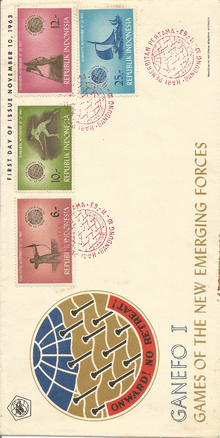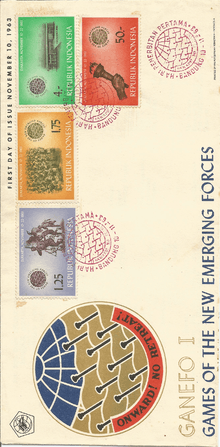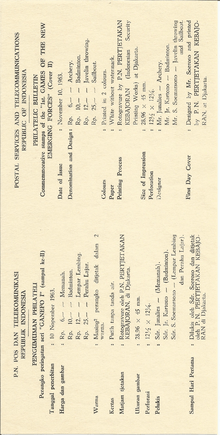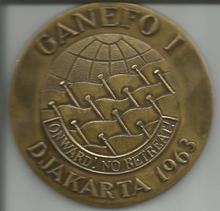GANEFO
 | |
| Motto | Onward, No Retreat! |
|---|---|
| Formation | 1962-1967 |
| Type | Sporting event organization |
| Purpose | To boycott the International Olympic Committee after the suspension of Indonesia from that organization |
| Headquarters | Jakarta, Indonesia |
Membership | 51 active members |
Official language |
English and host country's official language when necessary |
Federation cofounder | President Sukarno |
The Games of the New Emerging Forces (GANEFO) were the games set up by Indonesia in late 1962 as a counter to the Olympic Games. Established for the athletes of the so-called "emerging nations" (mainly newly independent socialist states), GANEFO made it clear in its constitution that politics and sport were intertwined; this ran against the doctrine of the International Olympic Committee, which strove to separate politics from sport. The IOC decreed that the athletes attending GANEFO would be ineligible to participate in the Olympic Games.
Indonesia established GANEFO in the aftermath of IOC censure for the politically charged 4th edition of Asian Games in 1962 in Jakarta which Indonesia hosted and for which Taiwan and Israel were refused entry cards. The IOC's eventual reaction was to indefinitely suspend Indonesia from the IOC. This was the first time the IOC suspended one of its members.
Another one of Sukarno's boycotted organizations was the United Nations (from 1965-1966), due to the selection of Malaysia as a non-permanent member of the United Nations Security Council (at that time they had a conflict). Therefore, he established CONEFO (Conference of New Emerging Forces).
1st GANEFO
| Host city | Jakarta, Indonesia |
|---|---|
| Nations participating | 51 |
| Athletes participating | 2,700 |
| Opening ceremony | 10 November 1963 |
| Closing ceremony | 22 November 1963 |
| Officially opened by | President Sukarno |
| Main venue | Gelora Bung Karno Stadium |
Participating Nations in 1st GANEFO
The first edition of GANEFO was held in Jakarta, Indonesia on November 10–22, 1963 for 13 days. 46 nations dispatched about 2,700 athletes and 7 nations sent staff and official. In total, 51 nations participated in the Games from Africa, Asia, Europe and Latin America such as Afghanistan, Albania, Algeria, Argentina, Belgium, Bolivia, Brazil, Bulgaria, Burma, Cambodia, Chile, Ceylon, Cuba, Czechoslovakia, DPR Korea, the Dominican Republic, Finland, France, East Germany, Guinea, Hungary, Indonesia, Iraq, Italy, Japan, Laos, Lebanon, Mexico, Mongolia, Morocco, the Netherlands, Nigeria, Pakistan, Palestine, China PR, the Philippines, Poland, Mali, Romania, Saudi Arabia, Senegal, Somalia, Thailand, Tunisia, Soviet Union, North Vietnam, the United Arab Republic (currently Egypt and Syria), Uruguay, Yugoslavia, etc.
The Soviet Union, in a show of solidarity, sent athletes to the first GANEFO, but in order not to jeopardize their position in the IOC, the Soviet athletes were not of Olympic caliber. And Japan let their athletes of non-Olympic caliber attend the first Ganefo to take account of the host nation's position of 1964 Summer Olympics.
1st GANEFO Commemorative Stamps
 Commemorative stamps of the "1st Games of the New Emerging Forces" |  Commemorative stamps of the "1st Games of the New Emerging Forces" |  Commemorative stamps of the "1st Games of the New Emerging Forces" |
Medal table at 1st GANEFO
In the first edition of GANEFO, China PR was the highest ranking nation with 65 gold medals, Soviet Union the second, Indonesia the third, the United Arab Republic the fourth, and North Korea the fifth.
| Rank | Nation | Gold | Silver | Bronze | Total |
|---|---|---|---|---|---|
| 1 | | 68 | 58 | 45 | 171 |
| 2 | | 27 | 21 | 9 | 57 |
| 3 | | 21 | 25 | 35 | 81 |
| 4 | | 22 | 18 | 12 | 52 |
| 5 | | 13 | 15 | 24 | 52 |
| 6 | | 5 | 0 | 4 | 9 |
| 7 | | 4 | 10 | 14 | 28 |
| 8 | |||||
| Total | |||||
[1] This medal table is incomplete and inaccurate; you can help by expanding it.
 Ganefo Bronze medal for Argentinian Water Polo Team. Donated by Héctor Ernesto Urabayen |  Ganefo Bronze medal for Argentinian Water Polo Team. Donated by Héctor Ernesto Urabayen |
2nd GANEFO (1st Asian GANEFO)
| Host city | Phnom Penh, Cambodia |
|---|---|
| Nations participating | 17 |
| Athletes participating | 2,000 |
| Opening ceremony | 25 November 1966 |
| Closing ceremony | 6 December 1966 |
| Officially opened by | Norodom Sihanouk |
The second edition of GANEFO had been planned to be held in Cairo, the United Arab Republic in 1967, but this was canceled due to political considerations.
The second GANEFO was held in Phnom Penh, Cambodia in November 25-December 6, 1966.
Participating Nations in 2nd GANEFO (1st Asian GANEFO)
About 2,000 athletes participated in the 2nd edition of GANEFO from 17 nations (Cambodia, Ceylon, China PR, Indonesia, Iraq, Japan, North Korea, Laos, Lebanon, Mongolia, Nepal, Pakistan, Palestine, Singapore, Syria, North Vietnam and Yemen).
The second GANEFO was restricted to Asia, except Guinea which participated in the qualifying tournament in Pyongyang, North Korea in August 1–11, 1965. Consequently, only 17 Asian countries participated in the second tournament in Phnom Penh, Cambodia in November 25-December 6, 1966 which was named '1st Asian GANEFO'.
Medal table at 2nd GANEFO (1st Asian GANEFO)
In the second edition of GANEFO, China PR was the highest ranking nation with 108 gold medals, North Korea the second, and Cambodia the third.
| Rank | Nation | Gold | Silver | Bronze | Total |
|---|---|---|---|---|---|
| 1 | | 108 | 57 | 34 | 199 |
| 2 | | 30 | 42 | 32 | 104 |
| 3 | | 10 | 42 | 10 | 62 |
| 4 | | 10 | 12 | 8 | 30 |
| 5 | |||||
| Total | |||||
This medal table is incomplete; you can help by expanding it.
2nd Asian GANEFO
In September 1967 was announced a second Asian GANEFO to be held in Beijing, China, in 1970, but later Beijing dropped the plans to host the Games, which were then awarded to Pyongyang, North Korea. But the Games never occurred and the GANEFO organisation collapsed.
See also
- CONEFO
- Athletics at the 1963 GANEFO
- Athletics at the 1966 GANEFO
- 1976 Summer Olympics (also boycotted by China, and African countries)
- 1980 Summer Olympics (also boycotted by Indonesia and China, and Western Bloc countries)
- 1984 Summer Olympics (also boycotted by North Korea, and Eastern Bloc countries)
- Friendship Games (game made by Soviet Union to boycott the 1984 olympics)
References
- ↑ Ewa T. Parker, “Ganefo I: Sports and Politics in Djakarta,” Asian Survey, 5:4 (1965), 181.
External links
| ||||||||||||||||||
| ||||||||||||||||||||||||||||||||||||||||||||||||||||||||||||||||||||||||||||||||||||||||
|